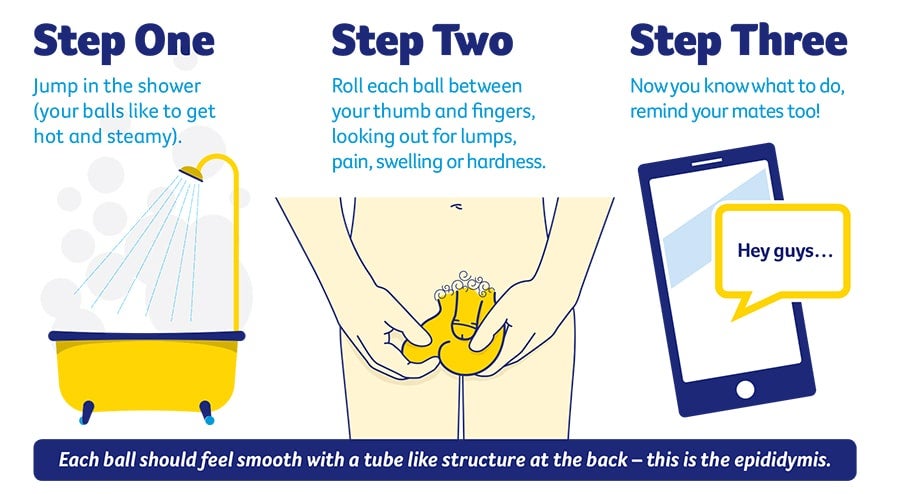Understanding testicular cancer
This booklet has been prepared to help you understand more about testicular cancer.
What is testicular cancer?
Testicular cancer is not a common cancer but it is the second most common cancer in young men (aged 20 to 39) excluding non-melanoma skin cancer.
The most common testicular cancers are germ cell tumours. There are two main types, seminoma and non-seminoma. Seminoma usually occurs in men aged between 25 and 45 years and tends to develop more slowly than non-seminoma cancers. Non-seminomasare more common in younger men, usually in their late teens or early 20s.
It is estimated that more than 1,000 people were diagnosed with testicular cancer in 2023. The average age at diagnosis is 36 years old.
Diagnosis of testicular cancer
If you notice any changes, you should visit your GP who will examine your testicles for any lumps or swelling. Other tests used to diagnose testicular cancer include:
Ultrasound
To confirm the presence of a mass.
Blood tests
Blood tests for the tumour markers alpha-fetoprotein, beta human chorionic gonadotrophin and lactate dehydrogenase.
Surgery
The only way to definitely diagnose testicular cancer is by surgical removal of the affected testicle. While many other types of cancers are diagnosed by biopsy (removing a small piece of tissue from the tumour), cutting into a testicle could spread the cancer to other parts of the body. Hence the whole testicle needs to be removed if cancer is strongly suspected.
After a diagnosis of testicular cancer
After finding out you have testicular cancer, you may feel shocked, confused, anxious or upset. These are normal reactions and a diagnosis of testicular cancer affects everyone in different ways.
It can be difficult to decide what type of treatment to have. Understanding the disease, the treatments available and possible side effects can help you weigh up your options. You may also want to talk to your doctor about how treatment for testicular cancer may affect your fertility.
Treatment for testicular cancer
Staging
In addition to the results of the diagnostic tests above, a chest x-ray and CT scans of the chest, abdomen and pelvis are done to determine whether and how far the cancer has spread.
Stage 1 means the cancer is found only in the testicle, stage 2 means it has spread to the lymph nodes in the abdomen or pelvis, and stage 3 means the cancer has spread beyond the lymph nodes to other areas of the body such as the lungs and liver.
If the cancer is found only in the testicle (stage 1), removal of the testicle (orchidectomy) may be the only treatment needed. If the cancer has spread beyond the testicle, chemotherapy and/or radiation therapy may be used as well.
Palliative care
In some cases of testicular cancer, your medical team may talk to you about palliative care. Palliative care aims to improve your quality of life by alleviating symptoms of cancer.
As well as slowing the spread of testicular cancer, palliative treatment can relieve pain and help manage other symptoms. Treatment may include radiation therapy (radiotherapy), chemotherapy or other drug therapies.
Treatment Team
Depending on your treatment, your treatment team may consist of a number of different health professionals, such as:
- GP (General Practitioner) – looks after your general health and works with your specialists to coordinate treatment.
- Urologist- specialises in the treatment of diseases of the urinary system (male and female) and the male reproductive system
- Medical oncologist – prescribes and coordinates the course of chemotherapy.
- Radiation oncologist – prescribes and coordinates radiation therapy treatment.
- Cancer nurse – assists with treatment and provides information and support throughout your treatment.
- Other allied health professionals – such as social workers, pharmacists, and counsellors.
Preventing testicular cancer
There are no proven measures to prevent testicular cancer.
Prognosis for testicular cancer
Prognosis means the expected outcome of a disease. An individual’s prognosis depends on the type and stage of cancer as well as their age and general health at the time of diagnosis. You may wish to discuss your prognosis and treatment options with your doctor, but it is not possible for any doctor to predict the exact course of your disease.
All testicular cancers can be treated and most testicular cancers are successfully treated.
Sources
- Understanding Testicular Cancer, Cancer Council Australia, © 2023. Last medical review of source booklet: August 2023.
- Australian Institute of Health and Welfare. Cancer data in Australia [Internet]. Canberra: Australian Institute of Health and Welfare, 2023 [cited 2023 Sept 04]. Available from: https://www.aihw.gov.au/reports/cancer/cancer-data-in-australia
13 11 20 Cancer Information and Support Line
Our 13 11 20 Cancer Information and Support Line can provide anyone affected by cancer with confidential, accurate information and support on any cancer-related concerns. Our cancer nurses can also inform you of services and programs.
If you prefer, you can email us on questions@cancerwa.asn.au or complete the form below and one of our 13 11 20 team members will respond to your enquiry.
"*" indicates required fields
